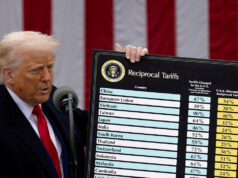THE DEPARTMENT of Finance (DoF) will push for its original version of a P60 per pack tobacco tax after the House of Representatives approved a lower rate.
“There’s still the Senate. We will try our best. This thing doesn’t end until the President signs it. We’re there, we’re keeping at it. We hope that they will come up to what is good for the country,” Finance Secretary Carlos G. Dominguez III said in a statement.
The House approved on final reading House Bill No. 8677, which proposes to increase the excise tax on tobacco products gradually by P2.50 per pack every year beginning at P37.50 in July 2019 to P45 in July 2022, and a 4% annual hike thereafter.
The bill passed with 187 affirmative votes, seven negative votes and one abstention.
The DoF wants to charge P60 per pack in 2019, with an annual increase of 9%, packaging the legislation as a health measure to deter cigarette consumption, with support from health advocates.
Excise taxes on tobacco are at P35 per pack as of July under the Tax Reform for Acceleration and Inclusion (TRAIN) law, from P30 per pack in January. The law will also raise tobacco taxes to P37.50 by 2020, and P40 per pack by 2022.
The DoF said that its measure is a stronger deterrent to smoking, especially among young people. The higher tax is also expected to help raise funds for Universal Health Care (UHC).
“Society has to agree what is more important: enough money for health care or favoring companies that produce products that damage health? That’s what society has to agree on, and that’s what the representatives in the legislature are supposed to reflect,” Mr. Dominguez said.
“Our revenues have to keep on going up because we are supporting a lot of people who are getting sick from smoking. That was all in the testimony. I was reading the summary of the testimonies, it’s overwhelmingly in favor of higher taxes for health reasons,” he added.
The Department of Health (DoH) hopes to reduce smoking prevalence from 22% in 2015 to 15% by 2022.
“Are we going to favor a few for the benefit of many? Again, it’s up to the legislature. We will continue our position, try to show the results why it is beneficial to have higher taxes.”
The DoF said that it has been collecting about P100 billion from tobacco taxes since the Sin Tax Reform law of 2012.
“Thus, amending the Sin Tax Reform Law to enable additional price increases on tobacco products is a win-win measure in terms of health, equity and revenues,” said Finance Assistant Secretary Antonio G. Lambino II in the same statement.
“One, it is an effective pricing strategy to reduce smoking; second, a healthier population leads to lower health care costs; and third, raising tobacco taxes generates substantial revenues for health care expenditures like universal health care, which benefits primarily the poorest of the poor,” he added.
The DoF also noted that cigarette tax increases do not adversely affect tobacco farmers but even benefits them.
“The decrease in the number of tobacco farmers, meanwhile, cannot be attributed to higher excise taxes, but to the introduction of other profitable farming opportunities available to them, such as shifting to high-value crops, which is also the intent of sin tax reform,” Mr. Lambino said.
“The welfare of tobacco farmers should be addressed through an expenditure policy, not through the tax structure. If, indeed farmers are at risk because of higher tobacco taxes, the Department of Agriculture, NTA (National Tobacco Administration) and the host LGUs (local government units) should have used the earmarked funds intended for tobacco farmers as provided in the law,” he added. — Elijah Joseph C. Tubayan



